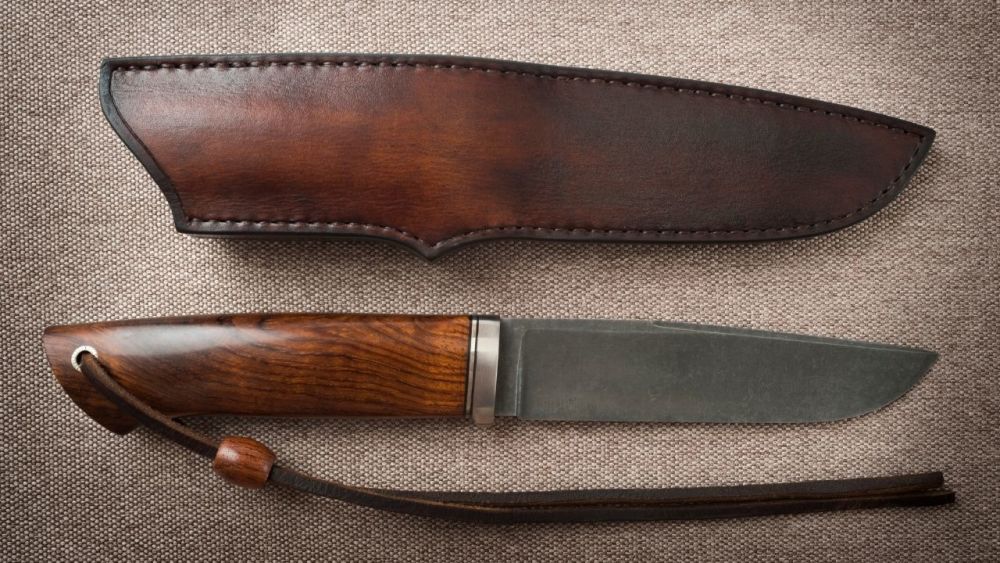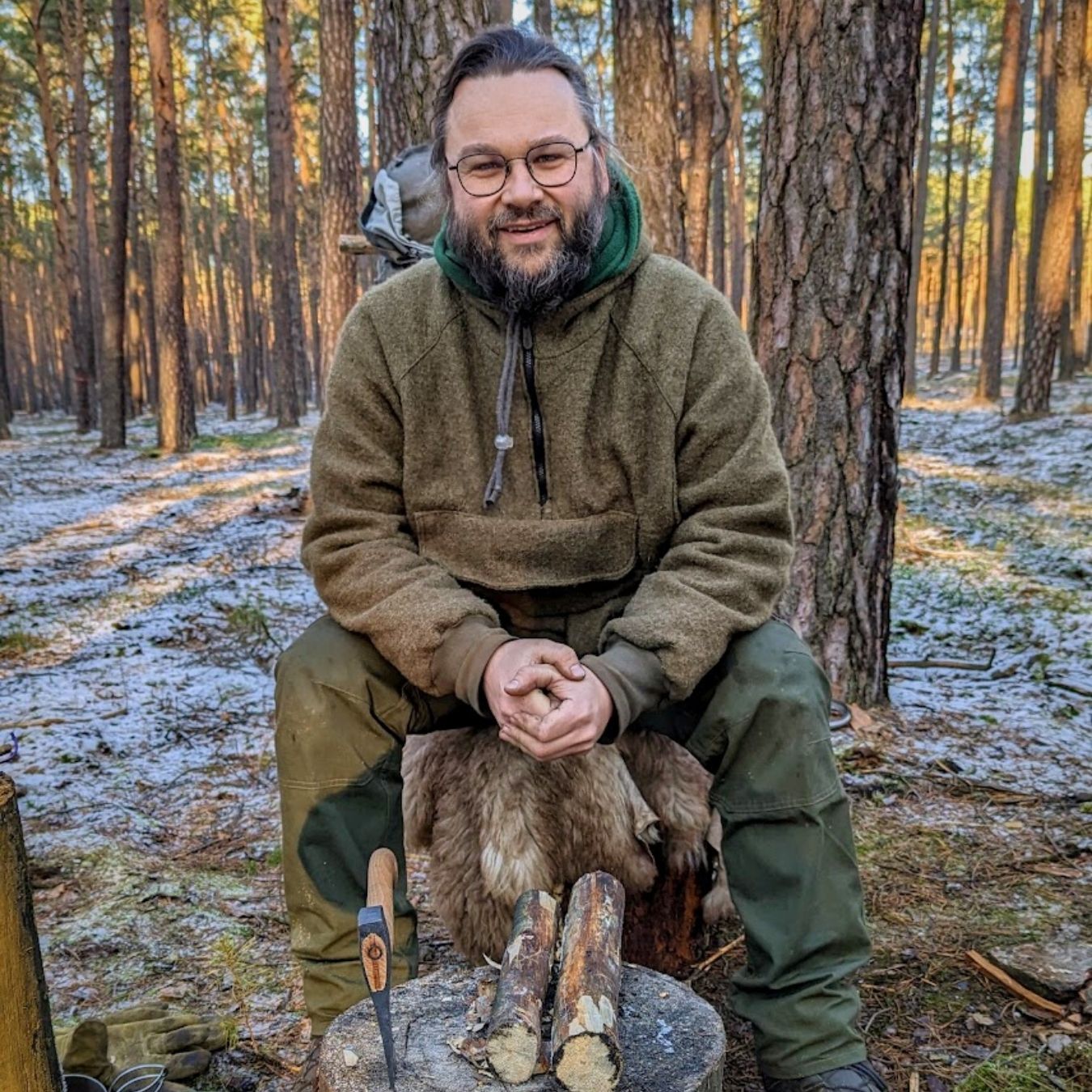
hunting knife
Noun
Meaning
A hunting knife is an essential tool for survival, bushcraft, and outdoor activities such as camping and hiking. It is a versatile and durable knife designed specifically for hunting and field dressing game. With a sharp blade and a sturdy handle, a hunting knife can be used for various tasks in the wilderness, including skinning, gutting, and butchering animals.
When venturing into the wild, a hunting knife is a reliable companion that can help you procure food, build shelters, and perform other essential tasks. Its compact size and portability make it easy to carry and handle in challenging environments.
Whether you are an experienced hunter or an outdoor enthusiast, a hunting knife is a must-have tool for your survival kit.

Examples
„I always make sure to bring my hunting knife with me when I go camping in the wilderness. It's an essential tool for survival and can be used for various tasks such as preparing food, building shelters, and even self-defense if necessary.“
„During our last hunting trip, my friend and I were tracking a deer when he realized he had forgotten his hunting knife back at camp. We had to improvise with other tools, but it was clear that having a hunting knife would have made the process much easier and more efficient.“
„When I first started learning bushcraft skills, one of the first things I invested in was a high-quality hunting knife. It quickly became my most trusted tool in the outdoors, and I've used it for everything from skinning game to carving wooden utensils.“
„I recently came across a group of experienced hunters who were discussing the importance of choosing the right hunting knife. They emphasized the need for a sharp and durable blade, as well as a comfortable handle for extended use in the field.“
„In a survival situation, a hunting knife can be a lifesaver. It can help you procure food, build traps, and even create fire by striking a ferro rod. It's a versatile tool that every outdoor enthusiast should have in their kit.“
Origin
The term "hunting knife" originates from the English language and is derived from the words "hunting" and "knife". The word "hunting" refers to the act of pursuing and capturing wild animals for food, sport, or survival, while "knife" refers to a sharp-edged tool used for cutting or stabbing.
The concept of using a knife for hunting can be traced back to ancient times when early humans relied on hunting as a means of survival. The earliest hunting knives were likely made from stone, bone, or other natural materials and were used for skinning, butchering, and preparing game.
Over time, as metalworking techniques developed, hunting knives began to be crafted from metals such as bronze, iron, and eventually steel. This allowed for the production of more durable and versatile blades, capable of withstanding the rigors of hunting and outdoor activities.
Today, hunting knives come in various shapes, sizes, and designs, each suited for different purposes and preferences. They are an essential tool for hunters, outdoor enthusiasts, and survivalists, serving a wide range of functions such as field dressing, skinning, gutting, and general camp tasks.
The hunting knife has evolved alongside human civilization, adapting to changing needs and advancements in technology. Despite the availability of modern tools, the hunting knife remains a symbol of self-reliance, craftsmanship, and connection to nature.
Synonyms
Hunting blade, Game knife, Field knife, Outdoor knife, Survival knife, Bushcraft knife, Tactical knife, Skinning knife
Antonyms
Fork, Spoon, Chopsticks, Butter knife, Steak knife, Butter spreader, Cheese knife, Bread knife
Relatives
Survival knife, Bushcraft knife, Camping knife, Pocket knife, Fixed blade knife, Folding knife, Tactical knife, Utility knife
Historical and cultural importance
A hunting knife has a rich historical and cultural significance. Throughout history, hunting has been a vital activity for human survival and a means of obtaining food and resources. The hunting knife, as an essential tool for hunters, has played a crucial role in this pursuit.
In many cultures, the hunting knife holds a symbolic value and is often passed down through generations. It represents a connection to ancestral traditions and the skills required for survival in the wilderness. The craftsmanship and design of hunting knives vary across different cultures, reflecting their unique hunting techniques and environments.
Historically, hunting knives were crafted from natural materials such as bone, antler, or stone. These materials were readily available in the surrounding environment and were shaped into functional and durable blades. As technology advanced, metal blades became more prevalent, offering improved cutting efficiency and durability.
The hunting knife also holds cultural significance in terms of its use in rituals and ceremonies. In some indigenous cultures, the hunting knife is used in initiation rites, symbolizing the transition from adolescence to adulthood and the responsibility of providing for the community.
Today, hunting knives continue to be cherished tools for outdoor enthusiasts, survivalists, and hunters. They are valued for their versatility, durability, and ability to perform various tasks such as skinning, gutting, and butchering game. The hunting knife remains an iconic symbol of self-reliance, resourcefulness, and the connection between humans and the natural world.
More information about the term hunting knife
The Hunting Knife: A Versatile Tool for the Wilderness
When it comes to survival in the wilderness, having the right tools can make all the difference. One such tool that every outdoor enthusiast should have in their arsenal is a hunting knife. A hunting knife is a versatile and essential tool that can be used for a wide range of tasks, making it a must-have for any adventurer.
1. Cutting and Preparing Game
One of the primary uses of a hunting knife is for cutting and preparing game. Whether you're hunting for food or for sport, a hunting knife is essential for field dressing and skinning your catch. Its sharp blade allows for precise cuts, making the process quick and efficient. With a hunting knife, you can easily remove the skin, separate the meat from the bones, and prepare it for cooking.
2. Campsite Tasks
Another important use of a hunting knife is for various campsite tasks. From cutting rope and opening packages to preparing firewood and building shelters, a hunting knife can handle it all. Its sturdy blade and ergonomic handle make it easy to handle and control, allowing you to complete tasks with ease. Whether you're setting up camp or maintaining it, a hunting knife is an indispensable tool.
3. Survival Situations
In survival situations, a hunting knife can be a lifesaver. Its versatility makes it an invaluable tool for building traps, crafting tools, and even starting fires. With a hunting knife, you can fashion snares and deadfalls to catch food, carve wooden utensils and tools, and create sparks for fire starting. In a survival scenario, having a reliable hunting knife can greatly increase your chances of staying alive.
4. Self-Defense
While it's always best to avoid dangerous situations in the wilderness, having a hunting knife can provide a sense of security. In the unlikely event that you encounter a threatening animal or person, a hunting knife can be used for self-defense. Its sharp blade can deter potential attackers and give you a chance to escape. However, it's important to remember that self-defense should always be a last resort and that proper training is necessary to handle such situations.
Conclusion
A hunting knife is a versatile and essential tool for anyone venturing into the wilderness. From cutting and preparing game to performing campsite tasks and even aiding in survival situations, a hunting knife is a reliable companion. Its versatility, durability, and functionality make it a must-have tool for any outdoor enthusiast. So, before your next adventure, make sure to pack a hunting knife and experience the many benefits it offers.
Back to overview

